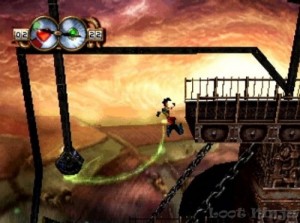Right then, now that we’ve warmed up let’s launch straight into the pretentious overestimation of my own abilities and talk about videogame reviews and analyses, shall we?
There’s plenty to say about the business of reviews, but something I’ve been thinking about lately is how shallow they are. I don’t mean this in the most critical sense per se, but rather that they are oriented towards only the typical gameplay issues, graphics, that sort of thing. Rarely do they delve into the more complex things such as tracing a lineage of a genre and understanding the influences of things, or really picking apart what a game is saying, except in the examples where it cannot be avoided.
This is not difficult to understand. At the cynical end, it’s because reviews are about getting sales for the reviewing body (Or in this day and age, online advertising revenue) and keeping publishers happy. I think this is a factor but it does seem rather overstated. At the more generous end of the scale, it’s because reviewers are simply talking about whether a game is worth your money and time, which is a perfectly reasonable stance to take, and pursuing this concept means that criticism isn’t fair because different kinds of analyses are not within the reviewer’s mandate.
Are these things contradictory, though? Can you provide a review of a game as fun and at the same time consider its place within gaming, and impartially assess what the game is doing in a more abstract sense? After all, if we are thinking about games as a form of creative expression beyond simple entertainment, or at least with the potential to be, surely we need to investigate the bad and the mediocre with as much depth and critical thought as the greats? For my own part I don’t think these are contradictory goals. I do however think they diverge somewhat, and to expect a review to take both angles is to ask a reviewer to cover a very broad subject. In terms of games themselves, not everything has to try to be Casablanca. There’s nothing inherently wrong with a dumb shooter which exists solely for ridiculous fun; despite this, there are plenty of efforts at making the things more emotionally engaging, more narrative-oriented, &c. And some games are starting to make use of their unique possibilities to make points that cannot be made in other mediums (BioShock springs to mind here).
Games also present a relatively unique problem for this kind of thought. Unlike other mediums, which see very occasional shifts in their presentation and, with the exception of sound for movies, don’t generally endure particularly revolutionary advancements, gaming (like computing as a whole) is part of a very rapidly advancing field in purely technical terms. We’ve all seen it on consoles; games towards the end of the console’s life are much more impressive than those at the beginning. But then the next generation comes along and we’re so worked up (understandably so) over what the new tech can do that we don’t play such close attention to other factors. The new tech opens up new possibilities, of course. You simply couldn’t do Dead Rising on a pre-current tech and have it do the concept justice. I do suspect that it serves as a distraction both on the part of designers and on the part of those who think about games.
So there seems to be a dearth of the more analytical review, or perhaps essay, outside of a few select places. What I’m thinking of is really more an analysis of what a given game or series or genre is, how it has evolved, where it got its ideas from, that sort of thing. On there narrative side of things there are obvious parallels to other mediums; you can find more than a few things discussing what The Road means and symbolizes and so on. And games have plenty of scope for things like that; consider how much mileage you’d get out of thinking about the messages of the Metal Gear Solid series. But what is there about the clever use of things like game mechanics, outside of simply noting that there is a clever use of game mechanics?
I should say, I know there are people out there talking about that stuff, and I don’t want to diminish what they are saying by acting like it doesn’t exist. It absolutely does and is very much worth finding and reading. Nonetheless it seems to be quite plain that there is a lack of a coherent body of thought on game criticism, in comparison to the thoughts on film or literature. And I think that ultimately, this harms the whole medium. As entertainment, games have things figured out pretty well. As vessels for communication, they’re still falling rather short. Games are expensive to make, especially compared to a lone alcoholic takking out The Old Man and the Sea on a typewriter. It is understandable and forgivable that many are made with profit uppermost in mind. Nonetheless many of us in the gaming sphere are all too ready to dismiss things as “just games” – which they might be in some contexts, but it makes it hard for them to develop into anything more if we don’t credit them as something more and start thinking about how to evolve them.
Hopefully as time passes this will change. The best way to ensure change is, of course, to bring it about.






